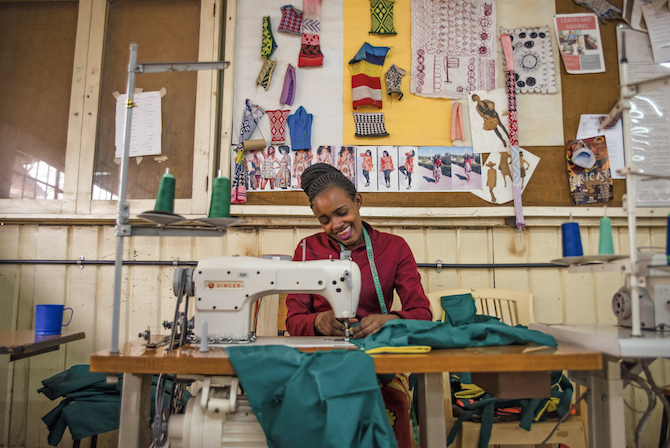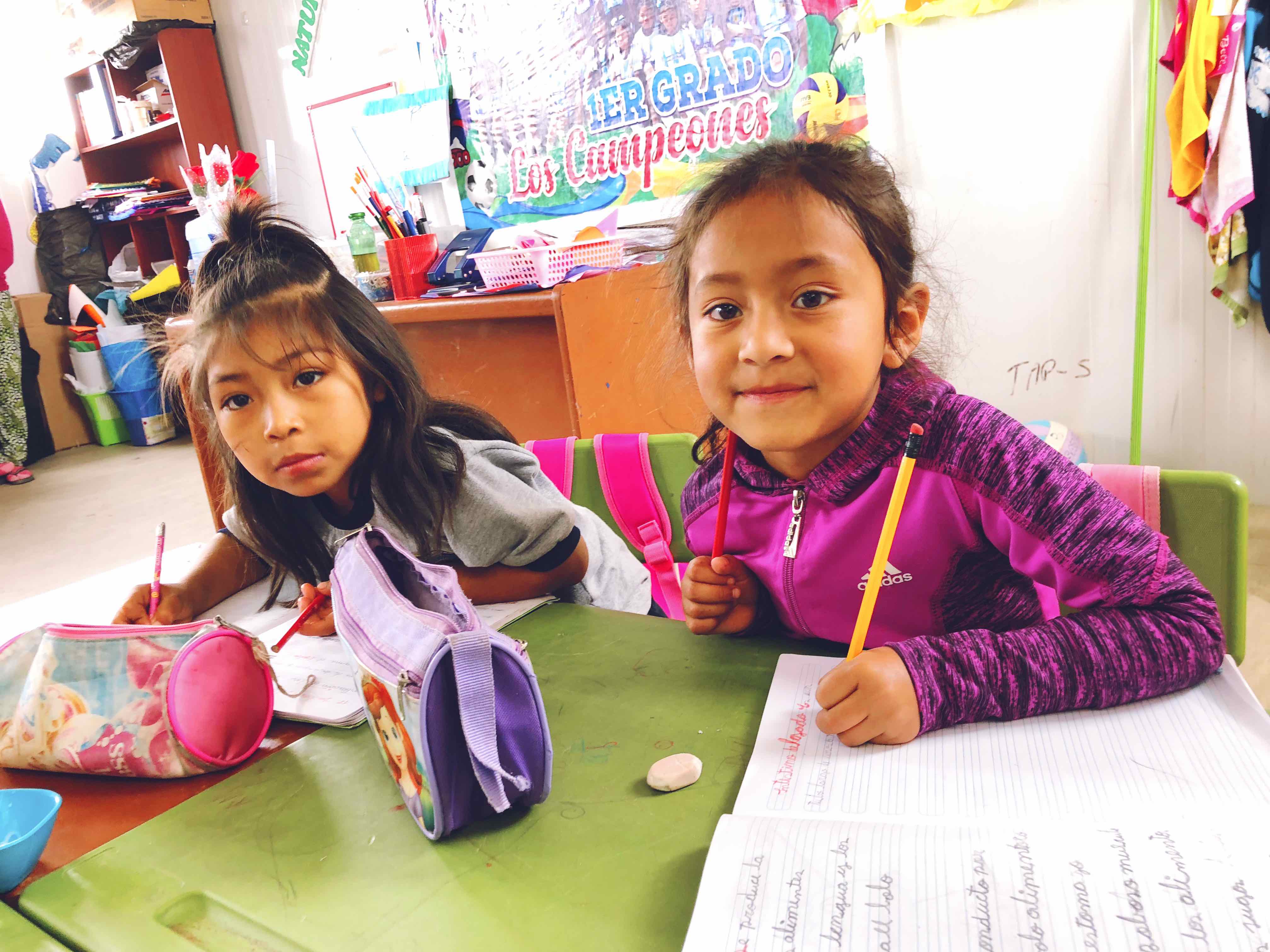Development Projects
- Details
- Hits: 70542
These are some of the Development Projects by District in our network:
East Africa

Participant in the income-generation activity in the Ruben Centre, Kenya
Edmund Rice Catholic Education Centre, Embulbul – Nairobi, Kenya
Edmund Rice Catholic Education Centre is a school with Nursery, primary, secondary school and vocation training. There is also a microfinance project for women.
Learn more: http://ercec.sc.ke/index.html
Edmund Rice Advocacy Network
Edmund Rice Advocacy Network runs advocacy programs within and outside Edmund Rice Ministries, which include human and environment right. They have an office and space where they run workshops etc. Edmund Rice Advocacy Network endeavours to enhance the quality of life for vulnerable groups through social transformation, care of the environment and protection and promotion of human rights.
Learn more: http://www.edmundriceadvocacy.net
Edmund Rice Eldoret Empowerment Programme – Eldoret, Kenya
Learn more: https://www.facebook.com/EdmundRiceEldoret/
Edmund Rice Karibu Group, Kibera – Nairobi, Kenya
Edmund Rice Karibu Group run camps for about 80 children and youth and do community outreach.
Learn more: https://www.facebook.com/EddyRiceCampKenya/
Edmund Rice Sinon Secondary School – Arusha, Tanzania
Edmund Rice Sinon Secondary School is secondary school with vocation training within it.
Learn more: http://www.edmundricesinon.ac.tz/
Education For Life – Eldoret, Kenya
Education for Life has about 500 families living and infected with HIV/AIDS and 500 orphans.
Learn more: https://www.facebook.com/EFLeldoret/
Mary Rice Centre, Kibera – Nairobi, Kenya
The Mary Rice Centre supports children with disabilities through basic learning skills, prevocational and vocational skills, therapy services and outreach program. It also supports the parents of the children through skill training and income generating activities in beadwork, tailoring and dressmaking.
Learn more: https://www.facebook.com/MaryRiceCentre
Ruben Centre, Mukuru kwa Ruben Slum – Nairobi, Kenya
The Ruben Centre is a complex centre within the Mukuru slum that runs many activities including a primary school, health centre, Community radio station, micro finance initiatives, HIV programmes, and urban farming.
Learn more: https://www.rubencentre.org/
Star Support Group – Yambio, South Sudan
Star Support Group targets people infected, affected and those in danger of being affected by HIV /AIDS and provide home based care, nutritional support, dispense drugs, psychosocial support, vocational training, awareness creation, education support and food production and training.
Learn more: http://www.starsupportgroup.org/
South Central Africa
Western Province, Zambia - Western Province, Zambia
As a way of operationalising the Congregation of Christian Brothers’ Our Way into The Future (OWITF), a first Cluster in the Western part of Zambia was established in 2016. The Hub of the Western Cluster was stationed in Mongu, 600km west of Lusaka, the capital city of Zambia. The Mongu Hub is serving three mission communities in Limulunga, Senanga and Luampa districts. The Western Cluster currently serves 1,361 direct beneficiaries.
Changa Changa School - Mazabuka, District, Zambia
Changa Changa School was established by the Congregation of Christian Brothers under the auspices of Monze Catholic Diocese in 2001 after conducting a needs assessment. The school has a pre-school, primary school offering Grades 1 - 7 and offers adult literacy education to the local community members. The pre - school and primary sections have total pupils’ enrolment of 700 (370 females and 340 males) and the adult section has enrolled 55 pupils (5 males and 50 females). Pupils progress from pre-school to primary school and a few to St Edmunds School for secondary education. A few, also go to St. Paul’s Skills Centre. For the past three years, Changa Changa School has achieved 98% pass rate in Grade 7 national examinations. The school has been among the top 5 primary schools in the district.
St. Paul’s Skills Centre - Mazabuka, Zambia
The Congregation of Christian Brothers established St Paul’s Training Centre in 1981 on behalf of the Bishop of Monze in Mazabuka district of Zambia. The overall goal of the centre is to empower the youth, who were unable to progress in their academic studies, with life skills. Since then, more than 2,000 youths have been equipped with skills and now have a source of income as they are able to get employed on the mines, farms and industries across the country. The Centre offers four main skills training programmes in Metal Fabrication, Automotive Mechanics, Electrical and Basic Computer Appreciation. These programmes are offered at Trade Test Level to cater for Grade Nine school leavers. The Zambia Institute of Certified Accountants (ZICA) technician programme was introduced in 2011 for Grade 12 School leavers and was awarded examination centre status in 2015.In 2013, Technical Education, Vocational and Entrepreneurship Training Authority (TEVETA) rated the Centre as a Grade Two institution and has been hosting accounting courses’ examinations.
The Justice Desk - Cape Town, South Africa
The Justice Desk was launched by the Congregation of Christian Brothers in January 2014 in Cape Town, South Africa. It is a human rights organisation whose purpose is to advocate, educate and equip in the areas of human rights, justice and advocacy. The Justice Desk operates in the South-Central District (South Africa, Zambia and Zimbabwe), as well as offers support and expertise to a global community. Its’ mother organisation is Edmund Rice International, an ECOSOC Advisor to The United Nations in both New York and Geneva. The Justice Desk has four key departments: Advocacy (Research, UN submissions ,National & international and Lobbying); Training (Human rights training, Specialized training and Capacity building); Education & Awareness (National & international justice campaigns, running a Youth ambassadors program in schools, and creating African context specific educational materials); and finally, Bridging (running immersion experiences, volunteerism projects, internships, and an In-Reach program for vulnerable youth).The Justice Desk currently serves 11,112 direct beneficiaries.
Latin America

Participants of the Reaching New Horizon Project
Centro Hermano Manolo – Cochabamba, Bolivia
The Centro Hermano Manolosupports working boys, girls and adolescents who study and work in the local market called La Cancha. The project has four programmes: personal development, educational support, further educational development (technical), and family support. The Centro Hermano Manolo Centre currently serves 105 youth and 91 parents a year.
Learn More: https://www.edmundorice.net/portfolio/cehm/
Nuevo Horizonte – Chimbote, Peru
Nuevo Horizonte provides academic reinforcement and cultural enrichment to children of families of the neighbourhoods around Nuevo Horizonte. Over 30 children receive academic support, participate in dance classes and take guitar lessons.
Learn more: https://www.edmundorice.net/portfolio/nuevo-horizonte/
Alcanzando Nuevos Horizontes (Reaching New Horizons) – Chimbote, Peru
Alcanzando Nuevos Horizontes provides support to a primary school of 240 boys and girls under 12 years old. The project improves the educational services providing psychological support, arts and English as a second language, family training in good parenting skills and a nutrition programme.
Learn More: https://www.edmundorice.net/portfolio/anh/
Defensoría Edmundo Rice – Buenos Aires, Argentina
Defensoría Edmundo Riceprovides training in advocacy to members of the Edmund Rice Schools in Latin America, and also coordinates activities and campaigns at the regional level. Defensoría Edmundo Rice reaches over 5,000 beneficiaries a year.
Learn more: https://www.edmundorice.net/portfolio/der/
India
Providence - Meghalaya, NE India
This is an inner-city project for school going dropouts. Named after Edmund Rice's belief in Providence, this project caters to about 300 student dropouts coming from challenged socio-economic backgrounds. Aware that the demands of earning a livelihood increases significantly as these students come into their late teens, Providence works at an innovative model of education where students, apart from studying for a Year 10 and 12 Certificate through a non-formal schooling system, also get an opportunity to check their aptitude for a variety of trades. By the time they finish Year 10 or 12 most are 18-20 years old and they have an opportunity to specialize in one of 10 trades and be placed in an apprentice job which Providence monitors. This helps them start earning as soon as they finish school and supplement their meagre family incomes.
Learn more: https://www.ccbi.org.in/
Asansol Projects – West Bengal
St. Vincent's Industrial Training Centre (SVITC), National Institute of Open Schooling (NIOS) and Nai Disha. These three non-formal education projects are for boys and girls of age groups of 5 years to early 20's and coming from very low income families. The projects are spread over two campuses of over 70 acres and complement the other two big formal schools on the set-up.
SVITC caters to about 200 odd school drop-outs above 18 years of age. It has 10 trades with durations ranging from 6 months to 2 years, some of which are government sponsored. Since Asansol is an Industrial town, it attracts economic migrants in large numbers. The training at SVITC is much sought after and hence it has a very thorough selection process to continue serving the neediest. It also has a placement cell that helps every graduating student secure a job and follows-up on their progress.
NIOS on the St Vincent’s Campus is a tutorial support for students enrolling in the National level Year 10 and 12 non-formal school systems. Over a 1000 students get enrolled at this Centre each year and since most of them have full-time jobs only about 100 students avail of the support class facility. The support classes greatly enhance the chances of students passing their examinations.
Nayi Disha on the adjoining St Patrick’s campus started at the Asansol Railway station for non-school going children. It is much like a formal free school that prepares children who have missed out on schooling to be ready to be enrolled in the NIOS by the time they turn 13. Apart from education, the children’s all round needs are catered to with significant involvement of St Patrick’s School staff and students.
Learn more: https://www.ccbi.org.in/
SMO Projects - Kolkata
The Mary Rice Centre (MRC), National Institute of Open Schooling (NIOS) and the Feeding Program are on the St Mary’s Orphanage (SMO) and Day School campus in Dumdum, Kolkata.
MRC serves the needs of differently-abled children, about 35 in number, and equips them with the skills required for integration into the mainstream.
The NIOS caters to students who have completed their Year 10 in the formal and non-formal schooling but for different reasons aren’t able to sustain themselves in the formal system. Quite a few who finish their NIOS at SMO go on to do well in life.
The Feeding Program provides a hot wholesome meal to about 140 homeless adults every evening.
Learn more: https://www.ccbi.org.in/
St George’s Free School - Kolkata
St George’s School has about 350 students who come from fairly poor backgrounds, their families often living on the footpaths or alleyways around central Kolkata. It’s a free school for poorer parents aspiring to give their children an education with the English medium advantage. As a contribution towards their afternoon meal, the children pay about a dollar a week. After Year 8 the students are prepared for the non-formal Year 10 NIOS examination.
Learn more: https://www.ccbi.org.in/
Oceania
Edmund Rice Ministries Foundation, Philippines Inc. has four Sectors:
1) Secretariat/Mission Development Office – Maasin City, So. Leyte
The Secretariat/MDO is the country management office of the Board of Trustees. It liaises with Government and Partners, supporting the three following Sectors in their programs of liberating lives through empowering poor and marginalised families and communities.
2) ERM Maasin – Maasin City, Southern Leyte Province and Municipalities of Bato and Palo in Leyte Province.
ERM Maasin through Community-Based Inclusive Development provides Child Assistance and Livelihood empowerment; Youth Development Animation for families; Community management of hearing, vision, physical and mental health problems by rural and urban communities; Disability Inclusive Disaster Risk Reduction empowerment of at-risk communities; and Sanitation and Livelihood empowerment of an Indigenous Community. These projects serve 16,556 direct beneficiaries.
3) ERM Kabankalan – Kabankalan City, Negros Occidental Province.
ERM Kabankalan has a single program called Sustainable Community Development envisioning the uplifting of small communities, including Indigenous Filipinos, from extreme poverty through integrated activities involving Livelihood projects, supporting children to stay in school through the provision of lunch, alternative learning classes for those who have dropped out of formal learning, and augmented by the training of Health Leaders in each community and other incidental social support. This program serves 2,359 direct beneficiaries.
4) ERM Cebu – Cebu City
ERM Cebu looks to partnering with other agencies in the City to jointly provide a program of Compassionate Education to Build and Uplift families living in dire circumstances: families dwelling in a cemetery and another group in makeshift shelters of a street-sidewalk in the Pier area. The program will have two wings: education of youth for livelihood and health education and related practices for the families.
Learn more:
Website: www.ermph.org
Callan Services - Papua New Guinea
Callan Services prepares participants (Teachers, Community Health Workers and Field Workers) to acquire basic community based rehabilitation skills to identify, assess and manage children and adults with disabilities in the communities and be able to make referrals to the nearest Health Centre for further diagnostic tests, treatments and/or rehabilitation.
Learn more: https://www.callanservices.org/
European Province
SERV - Salford Edmund Rice Volunteers – England
Learn more: http://www.edmundriceengland.org/network-activities/revive/
Westcourt Centre Belfast
Westcourt is committed to working towards social justice by giving voice and support to homeless people and those in need.
Learn more: www.westcourtcentre.org
Cork Life Centres– Ireland
The Cork Life Centre seeks to empower young people to reach their full potential through the provision of educational and activity-based life skills. They strive to achieve this in an environment of safety, mutual respect and guidance with the co-operation of families and support agencies.
Learn more: https://corklifecentre.org/
Edmund Rice Camps
The Edmund Rice Camps are based on the example and spirituality of Blessed Edmund Rice. They invite young people to engage in voluntary work and to contextualise it with a programme of daily Reflection and Evaluation. The success of the Camps is founded on a principal of one Leader to every child. In this way our young service users are guaranteed the time and attention that ensures they have a positive experience.
Learn more:
http://edmundricecampsireland.weebly.com/
http://www.edmundriceengland.org/camps/







